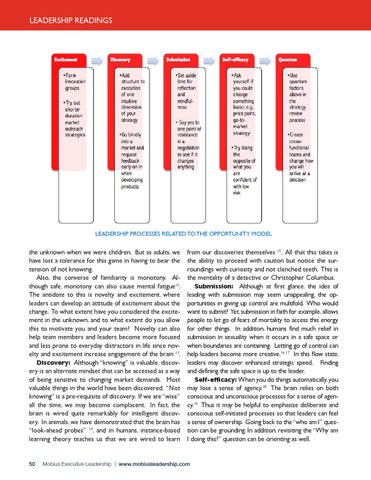LEADERSHIP READINGS
LEADERSHIP PROCESSES RELATED TO THE OPPORTUNITY MODEL
the unknown when we were children. But as adults, we have lost a tolerance for this game in having to bear the tension of not knowing. Also, the converse of familiarity is monotony. Although safe, monotony can also cause mental fatigue12. The antidote to this is novelty and excitement, where leaders can develop an attitude of excitement about the change. To what extent have you considered the excitement in the unknown, and to what extent do you allow this to motivate you and your team? Novelty can also help team members and leaders become more focused and less prone to everyday distractors in life since novelty and excitement increase engagement of the brain 13. Discovery: Although “knowing” is valuable, discovery is an alternate mindset that can be accessed as a way of being sensitive to changing market demands. Most valuable things in the world have been discovered. “Not knowing” is a pre-requisite of discovery. If we are “wise” all the time, we may become complacent. In fact, the brain is wired quite remarkably for intelligent discovery. In animals, we have demonstrated that the brain has “look-ahead probes” 14, and in humans, instance-based learning theory teaches us that we are wired to learn
50
from our discoveries themselves 15. All that this takes is the ability to proceed with caution but notice the surroundings with curiosity and not clenched teeth. This is the mentality of a detective or Christopher Columbus. Submission: Although at first glance, the idea of leading with submission may seem unappealing, the opportunities in giving up control are multifold. Who would want to submit? Yet, submission in faith for example, allows people to let go of fears of mortality to access this energy for other things. In addition, humans find much relief in submission in sexuality when it occurs in a safe space or when boundaries are containing. Letting go of control can help leaders become more creative.16, 17 In this flow state, leaders may discover enhanced strategic speed. Finding and defining the safe space is up to the leader. Self-efficacy: When you do things automatically, you may lose a sense of agency.18 The brain relies on both conscious and unconscious processes for a sense of agency.19 Thus it may be helpful to emphasize deliberate and conscious self-initiated processes so that leaders can feel a sense of ownership. Going back to the “who am I” question can be grounding. In addition, revisiting the “Why am I doing this?” question can be orienting as well.
Mobius Executive Leadership | www.mobiusleadership.com

